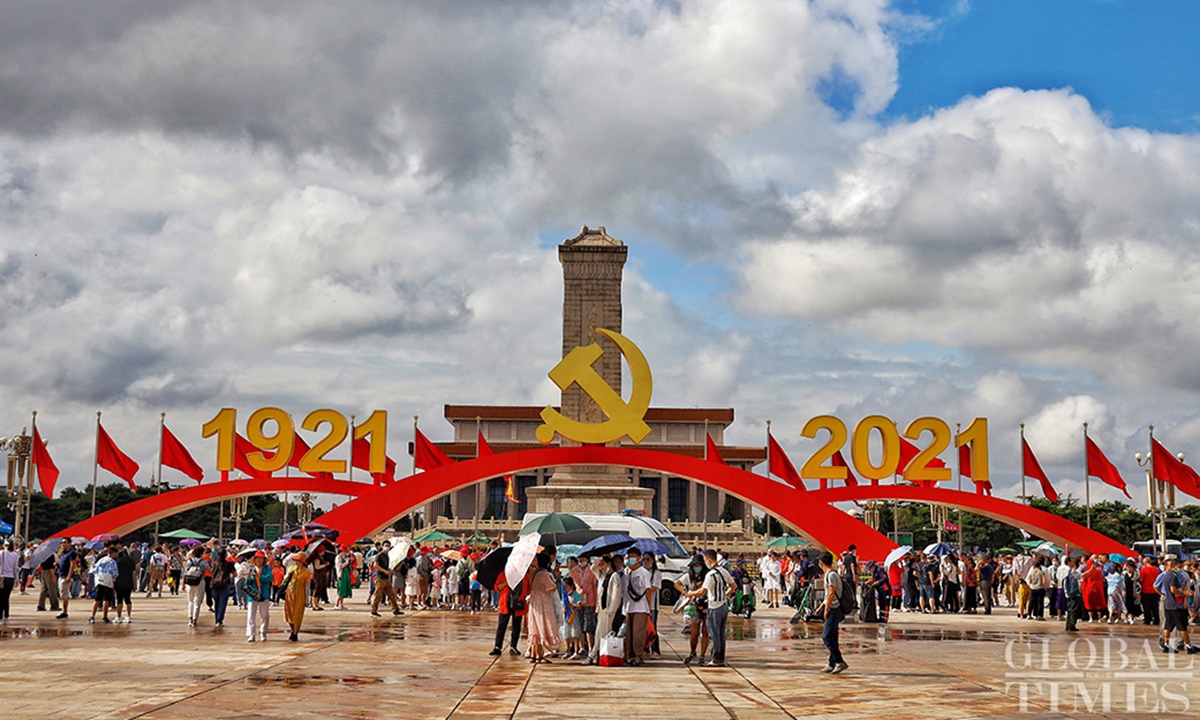
Tourists visited Tiananmen Square to relive the exciting moment of the CPC centennial Photo:Li Hao/GT
The sixth plenary session of the 19th Communist Party of China (CPC) Central Committee will be held in Beijing from November 8 to 11, during which a key resolution on the major achievements and historical experience of the Party's 100 years of endeavors will be reviewed.
This was decided at a meeting of the CPC Central Committee Political Bureau on Monday. Xi Jinping, general secretary of the CPC Central Committee, presided over the meeting.
Held at a special time of the CPC's centennial while achieving the goal of building a moderately prosperous society in all respects, the plenary session is expected to systematically summarize the experience that led the Party and the nation to their current achievements and look to the future with a bigger vision and greater unison, experts said.
At the Monday meeting, the CPC Central Committee Political Bureau heard a report on soliciting opinions for drafting a key resolution on the major achievements and historical experience of the Party's 100 years of endeavor and decided to submit the draft, after revisions, to the plenary session for deliberation.
The views and suggestions from all sides - both within and outside the Party - were collected. Xi also chaired a symposium to hear from the central committees of the non-CPC political parties, the head of the All-China Federation of Industry and Commerce, and individuals with no party affiliation.
The draft won wide recognition from various regions, departments, and sides, along with delegates to the 19th CPC National Congress. Their views and suggestions were absorbed in the document.
Analysts pointed out that it is necessary to determine the Party's major achievements and important historical experience accumulated in the past 100 years before embarking on a new journey to fully build a great modern socialist country and upholding and developing socialism with Chinese characteristics in the new era.
"The sixth plenary session will re-enhance the Four Consciousnesses and re-affirm the Four Matters of Confidence to ensure the Party will move forward in unison," Yang Xuedong, a professor of political science at Tsinghua University, told the Global Times on Monday.
The Four Consciousnesses refers to "consciousnesses of the ideology, the whole, the core and the line."
The Four Matters of Confidence refers to "firm confidence in its path, theory, system and culture."
Experts also noted that the sixth plenary session is the penultimate plenary session of each CPC Central Committee, which usually focuses on ideology, Party building and the Party's style of work. A key resolution is expected to be reviewed at the session.
In the history of the Party, two CPC Central Committee plenary sessions had focused on studying historical questions and both generated important resolutions.
Resolution on Certain Issues in the History of the CPC, released in 1945, summarized experience from the founding of the Party to the breakout of the War of Resistance against Japanese Aggression. The Resolution on Certain Questions in the History of the CPC Since the Founding of the People's Republic of China, released in 1981, determined that the Cultural Revolution was an error while upholding the guiding role of Mao Zedong Thought.
The previous two resolutions are answers to more specific "issues" and "questions," and the third one, with richer experience to refer to, may have a more ambitious vision, Fan Peng, a research fellow with the Chinese Academy of Social Sciences' Institute of Political Sciences, told the Global Times on Monday.
The Monday meeting mentioned how the CPC made socialism, an ideal of 500 years, into reality, and led China, a civilization of 5,000 years, into modernization, according to Xinhua.
Fan believed those words demonstrated that the third resolution is standing at a strategic and commanding position to reflect on the past century, summarize experience on how it successfully led the country and the people here, and shed light on the future of the Party's governance path toward more ambitious goals, including common prosperity and the national rejuvenation.
Such reflections and summaries keep the Party lively, Fan said, adding that some unique factors in China's system, like how to achieve socialist democracy, and how to implement the principle of democratic centralism within the Party, are part of the "experience."
The sixth plenary session of the 19th CPC Central Committee is being held at a time when quick and effective anti-epidemic responses demonstrate the capabilities of China's system.
In the past, the West looked at China through the lens of an "ideological enemy," smearing China without any intention to really understand the country and its system. Although those smears may not stop, the West will treat the CPC and its self-reflection seriously, experts said.
Amid outside speculation on whether the Taiwan question will be covered, Fan said the possibility cannot be ruled out, as reunification is the prerequisite for national rejuvenation — the CPC's historical mission.
A meeting held by the Political Bureau of the CPC Central Committee on August 31 said the sixth plenary session will study the issue of comprehensively reviewing the major achievements made and the historical experience accumulated during the Party's 100 years of endeavor, the Xinhua News Agency reported.
A review of the major achievements and the historical experience accumulated during the Party's 100 years of endeavor is needed for the new course of fully building a modern socialist country and for upholding and promoting socialism with Chinese characteristics in the new era, the meeting said.
It is also needed for upholding General Secretary Xi Jinping's core position at the CPC Central Committee and in the whole Party, as well as the authority of the CPC Central Committee and its centralized, unified leadership, the meeting stressed.
The whole Party should try to understand why the CPC succeeded in the past 100 years and learn how it can sustain the success, following the principle of historical materialism and through a correct perspective of the CPC's history, it said.




